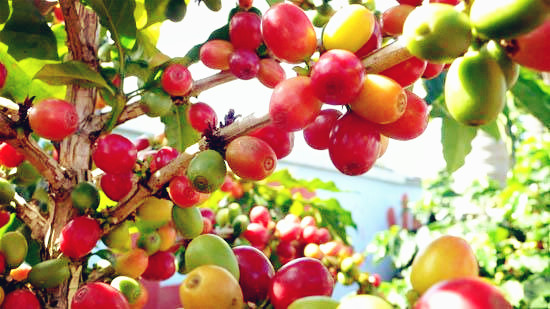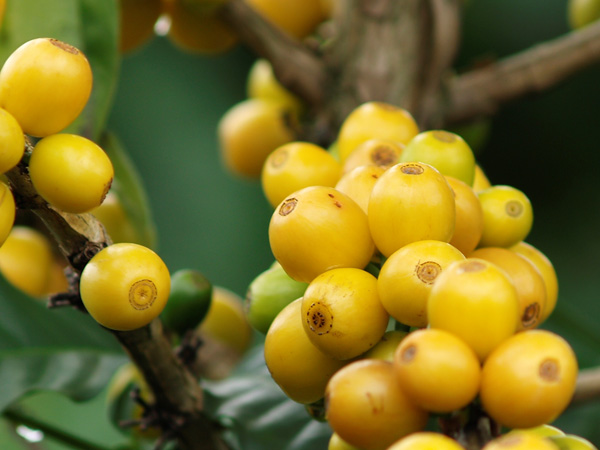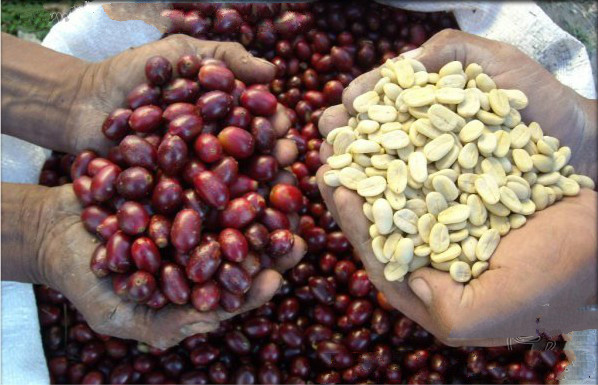Asia China Fine Coffee Bean Origin Indonesia Bali Coffee Fine
Coffee producing areas in China are mainly in Hainan, Yunnan, Guangdong and Taiwan. Northern Hainan Island, southern Yunnan Province, located between 15 degrees north latitude and the Tropic of Cancer, its coffee is strong but not bitter, fragrant but not strong, very unique. And with a little fruit flavor, it is the top grade of coffee, which is highly praised internationally.
Taiwan is located in the subtropics, the territory is mountainous, and there is an obvious rainy season. As far as coffee is concerned, it is a good growing environment for coffee. Since the British introduced coffee trees during Guang Xu's time, they are still planted on a small scale. The more famous producing areas are Huilin Farm (more than 1,000m above sea level) in Nantou Mountain area and Hebao Mountain (294m above sea level) in Yunlin Gukeng. Coffee flavor is similar to Central and South American beans, has a soft sour taste and good texture, mild taste.
Yunnan is the main coffee bean producing area in China. Yunnan is located in the subtropical mountain climate zone south of the Tropic of Cancer, with unique plateau red soil, fertile and loose soil and mild climate, which is especially suitable for growing small-grain coffee.
Yunnan coffee was first introduced by French missionaries in 1902. Up to now, there are still 24 coffee trees with more than 90 years old in Zhukula Township, Binchuan County. In 1914, the border people of the Ruili Jingpo nationality were introduced from Burma to Nongxian Village. Tibika and Bobang, two classic high-quality coffee varieties, are the main cultivated varieties of coffee in Yunnan. Because the morphology and habits of the two varieties are similar, the two varieties are mostly mixed. Bobang terminal bud tender leaves are green, called green top coffee; Tiebika top leaves are red copper, called red top coffee.
After inspecting the coffee planting and primary processing base in Yunnan, international coffee organization tasting experts rated Yunnan coffee as the kind of small seed coffee processed by Colombian wet processing, which is the highest quality coffee in the world.
At present, Yunnan coffee is mainly distributed in 11 prefectures and cities, such as Baoshan, Simao, Yuxi and Dehong. Among them, the quality of coffee in Baoshan and Simao area is the best.
Lujiangba in the dry and hot valley is the "tropical treasure house" of Baoshan. The average temperature in the dam is 21.5℃, the highest is 40.4 ℃, and there is almost no frost all the year round. The small grains of coffee cultivated here are strong but not bitter, fragrant but not strong, small and well-proportioned, mellow and fruity.
Simao, located in the upper reaches of the Lancang River, is famous for its steep terrain and is one of the famous producing areas of Pu'er tea in China. At the same time, Simao is also the area with the largest coffee planting area in China. The planting area of coffee is about 150000 mu, and the output can reach 22500 tons. Simao area is between 1000 and 2000 meters above sea level, with mountains and slopes as the main topography, with many dry and hot river valleys and barren mountains, fertile soil, sufficient sunshine, rich rainfall and large temperature difference between day and night, which is very suitable for coffee growth. Due to the unique geographical environment and climatic conditions, Yunnan Simao coffee has formed a unique flavor of strong but not bitter, fragrant but not strong, with a little fruit flavor. The quality of coffee depends on many factors, such as growing environment, climate, cultivation and management techniques and so on. Its best growing environment is low latitude, high altitude, sufficient rainfall and suitable sunshine, but other areas in this zone, such as Hawaii and Saudi Arabia in the United States, or low altitude or little rain in the desert. Only Simao in Yunnan Province has all kinds of suitable conditions, so it creates the mellow flavor of Simao coffee.
In the traditional culture of Bali, coffee is used as a cheap beverage raw material. The flavor and quality of the region have been unstable or depressed, and most of them have become cheap commercial beans. Rodney and his partners decided to change the local people's stereotype of coffee. They chose Wubu Market, the cultural center of Bali, and opened the only boutique cafe on the island. Rodney and two other partners themselves have also obtained the international general coffee Q certification to check the quality of their own coffee, and it is also the only local cafe with this certification. The cafe has two bean dryers from 1kg and 4kg, and all the coffee in the shop comes from high-quality raw beans from the local or nearby producing areas (for example, Java, Sulawesi, New Guinea, Florus) and so on.
Indonesia Bali Karana Kintamani Ubud Natural
Country: Indonesia
Producing area: Kintamani Volcano area
Altitude: 1400 m
Harvest season: June to September every year
Treatment: insolation
Varieties: USDA, Karka, Smuri 795
Treatment plant: Wubu treatment plant
Flavor: ripe peach, pineapple, black sugar

Important Notice :
前街咖啡 FrontStreet Coffee has moved to new addredd:
FrontStreet Coffee Address: 315,Donghua East Road,GuangZhou
Tel:020 38364473
- Prev

Special treatment method of Diamond Manor of Huilan Plateau in Huilan Plateau producing area of Yellow bourbon Coffee in Colombia
Colombia's boutique bean producing areas are mainly in the south, more than 1500 meters above sea level, including San Augustin, Huila in Huilan province, Popayan, Cauca in Cauca province, Nari ñ o province, and Tolima province, all of which have delicate sour and raspberry aromas, caramel aromas and full sweetness. Bourbon species native to the Indian Ocean
- Next

Grade A water washing treatment of pearl beans at PNG Kimmel Manor, Papua New Guinea, Indonesia
Located in the east of the Indonesian archipelago, Papua New Guinea, which is dominated by highlands, has a pattern of large manors / farms and small farmers, growing a variety of coffee varieties. The flavor of coffee in Papua New Guinea is very different from that of coffee from other Asian regions such as Indonesia, South Asia, India or the Pacific Islands; compared to Indonesian beans, which are mostly semi-washed (wet peeled).
Related
- Does Rose Summer choose Blue, Green or Red? Detailed explanation of Rose Summer Coffee plots and Classification in Panamanian Jade Manor
- What is the difference between the origin, producing area, processing plant, cooperative and manor of coffee beans?
- How fine does the espresso powder fit? how to grind the espresso?
- Sca coffee roasting degree color card coffee roasting degree 8 roasting color values what do you mean?
- The practice of lattes: how to make lattes at home
- Introduction to Indonesian Fine Coffee beans-- Java Coffee producing area of Indonesian Arabica Coffee
- How much will the flavor of light and medium roasted rose summer be expressed? What baking level is rose summer suitable for?
- Introduction to the characteristics of washing, sun-drying or wet-planing coffee commonly used in Mantenin, Indonesia
- Price characteristics of Arabica Coffee Bean Starbucks introduction to Manning Coffee Bean Taste producing area Variety Manor
- What is the authentic Yega flavor? What are the flavor characteristics of the really excellent Yejasuffi coffee beans?

